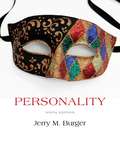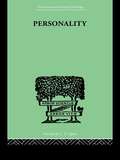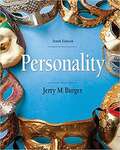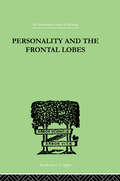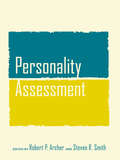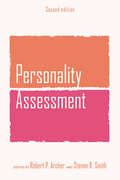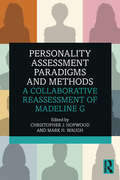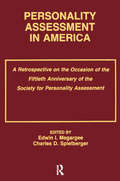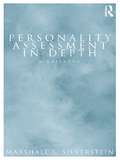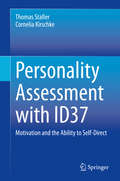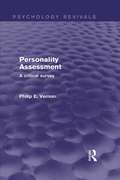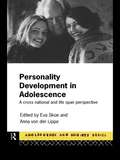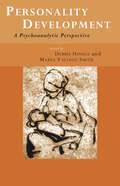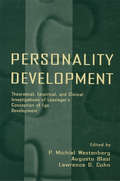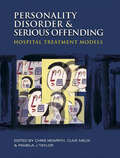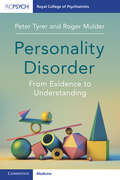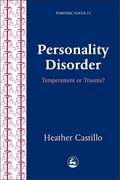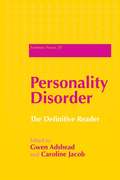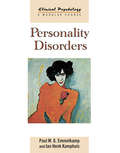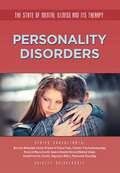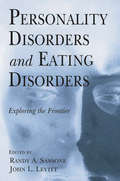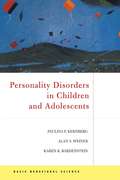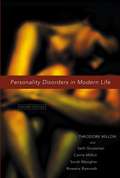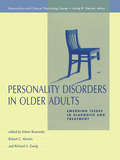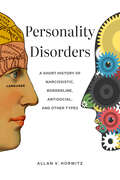- Table View
- List View
Personality
by Jerry M. BurgerThis proven text fuses the best of theory-based and research-based instruction to give readers an illuminating introduction to personality that is accessible and understandable. The author pairs "theory, application, and assessment" chapters with chapters that describe the research programs aligned with every major theoretical approach. Biographical sketches of theorists and accounts of the stories behind influential research programs help readers gain an understanding of how classic and contemporary findings relate to each other, and reinforce the idea that theory and research perpetuate one another. In-text self-assessments encourage readers to interact with the material and allow them to learn more about their own personality.
Personality (International Library Of Psychology Ser.)
by R G GordonFirst Published in 1999. Routledge is an imprint of Taylor & Francis, an informa company.
Personality (Mindtap Course List Ser.)
by Jerry M. BurgerHow would you describe your personality, or can you? Whatever your answer, this text will help you understand personality -- the qualities and traits that form every individual's distinctive character. You'll learn about theoretical explanations of personality, and about the research that illuminates how those theories are relevant in the world around you. Biographical sketches of theorists and accounts of the stories behind influential research programs help you see how classic and contemporary findings relate to each other, and illustrate the connection between theory and research. As you read, personality tests encourage you to interact with the material -- and learn more about your own personality.
Personality And The Frontal Lobes: AN INVESTIGATION OF THE PSYCHOLOGICAL EFFECTS OF DIFFerent Types (International Library Of Psychology Ser.)
by Petrie, Asenath"First Published in 1999, Routledge is an imprint of Taylor & Francis, an informa company."
Personality Assessment
by Robert P. Archer Steven R. SmithPersonality Assessment provides an overview of the most popular self-report and performance-based personality assessment instruments. Designed with graduate-level clinical and counseling psychology programs in mind, the book serves as an instructional text for courses in objective or projective personality assessment. It provides coverage of eight of the most popular assessment instruments used in the United States—from authors key in creating, or developing the research base for these test instruments. The uniquely informed perspective of these leading researchers, as well as chapters on clinical interviewing, test feedback, and integrating test results into a comprehensive report, will offer students and clinicians a level of depth and complexity not available in other texts.
Personality Assessment
by Robert P. Archer Steven R. SmithThe first edition of Personality Assessment provided an overview of the most popular self-report and performance-based personality assessment instruments. The chapter authors were key members in creating or developing the research base for the eight test instruments covered in the book. The text was geared with graduate-level clinical, school, and counseling psychology courses in mind. While still retaining all the attractive features of the first edition, this revision will reflect the advances in the field since 2008. Chapter contributors updated and expanded on reliability and validity data, clinical utility, multicultural considerations, and implications for therapeutic assessment. Another distinctive feature of this second edition is a companion website that features ancillary materials such as PowerPoints and test banks.
Personality Assessment Paradigms and Methods: A Collaborative Reassessment of Madeline G
by Christopher J. Hopwood Mark H. WaughThis book is an update of Paradigms of Personality Assessment by Jerry Wiggins (2003, Guilford), a landmark volume in the personality assessment literature. The first half of Wiggins (2003) described five major paradigms: psychodynamic (as exemplified by the Rorschach and TAT), narrative (interview data), interpersonal (circumplex instruments), multivariate (five-factor instruments), and empirical (MMPI). In the second half of the book, expert representatives of each paradigm interpreted test data from the same patient, Madeline. In this follow-up, personality experts describe innovations in each of the major paradigms articulated by Wiggins since the time of his book, including the advancement of therapeutic assessment, validation of the Rorschach Performance Assessment System, development of a multimethod battery for integrated interpersonal assessment, publication of the Restructured Form of the MMPI-2, and integration of multivariate Five-Factor Model instruments with personality disorder diagnosis. These innovations are highlighted in a reassessment of Madeline 17 years later. This book, which provides a rich demonstration of trans-paradigmatic multimethod assessment by leading scholars in the personality assessment field in the context of one of the most interesting and thorough case studies in the history of clinical assessment, will be a useful resource for students, researchers, and practicing clinicians.
Personality Assessment in America: A Retrospective on the Occasion of the Fiftieth Anniversary of the Society for Personality Assessment
by Edwin I. Megargee and Charles D. SpielbergerWhereas most psychology books discuss current or future trends, this one focuses on the past. It consists of a collection of important and historically significant writings by a select group of men and women who, over the past 50 years, were honored by their colleagues for their distinguished contributions to the field of personality assessment. Published from 1939 through 1989, most of the papers were SPA Presidential addresses or presentations by the recipients of the Society's Distinguished Contributions Award. Taken as a whole, they provide a unique perspective on the evolution of personality assessment in America from the perspective of those who have made important contributions to that history. The writings are not merely of historical interest, but intrinsically important scientific contributions, some of which were in danger of being lost or forgotten. The editors feel it is important to preserve and pass on this valuable legacy for the education and edification of later generations. It is not only its historical perspective that makes this book unique. This book provides first-hand discussions of crucial issues in personality assessment written by the gifted men and women who were actually grappling with these problems at the time, without knowing what the outcomes would be. Readers will find that these papers provide insights not only into the conflicts and controversies, but also into the ideas, attitudes, and emotions of the men and women who took part in them.
Personality Assessment in Depth: A Casebook (Personality and Clinical Psychology)
by Marshall L. SilversteinComprised of five unique and extended case studies, Personality Assessment in Depth examines contemporary clinical problems that are familiar to clinicians, but have not been explored extensively in the personality assessment field. Each case study demonstrates the test protocols of the Rorschach test, Thematic Apperception Test, MMPI or MCMI, and Human Figure Drawings. Important clinical questions and areas of theoretical concern are examined, including differential diagnosis of disorders of affect and personality in light of contemporary viewpoints about these disturbances, personality and adaptation accompanying neuropsychological deficit, and stages of development, including differentiating these from personality characteristics viewed longitudinally, the latter demonstrated by a noteworthy comparison of two evaluations of the same patient, first as a 15-year-old adolescent and then as a 25-year-old adult. A battery of performance and self report personality instruments are applied to the cases, allowing the author to integrate findings across multiple tests and thereby expose clinical psychology students to personality assessment in a broad perspective. Cases are discussed comprehensively, relying on a thorough consideration of thematic content examined alongside formal test scores. Further, the Rorschach findings are examined using both the Exner Comprehensive System and the recently-introduced Rorschach Performance Assessment System approaches. The cases are considered using a broad psychodynamic framework for interpretation, employing classical ego psychology, object relations, and self psychological theoretical perspectives. This is an essential casebook for professionals and students, demonstrating the depth and richness of personality considered alongside the empirical foundations of personality assessment.
Personality Assessment with ID37: Motivation and the Ability to Self-Direct
by Thomas Staller Cornelia KirschkeThis book offers a practical approach to fostering self-efficacy and improving understanding of others’ behavior. The authors introduce the ID37 instrument as a psychological model and assessment procedure for analyzing personalities and motivations, showing how exploring one’s own personality can lead to more effective self-direction, greater satisfaction with life, and more profound success. By combining aspects of motivational psychology with practical diagnostics application, the book aims to demonstrate the practical benefits of motivation analysis on understanding identity formation and development. Among the topics addressed:Personality traits and statesMotivation-driven actionThe 16 motives and their impactObstacles to achieving satisfactionCase studies from business coaching, leadership, and HR management scenarios · Including the basics on motivational psychology as well as a variety of case studies and practical tips for day-to-day work, The ID37 Personality Analysis is a useful reference for students and researchers interested in personality development as well as HR managers and leaders looking to deepen their knowledge of motivational psychology.
Personality Assessment: A critical survey (Psychology Revivals)
by Philip E. VernonOriginally published in 1964, the aim of this book was to analyse the psychological processes involved in understanding personality, and to consider how the psychologist could help in making more accurate assessments. Professor Vernon discusses in detail the scientific status of psychoanalytic and other ‘depth’ theories of motivation, the value of different types of psychotherapeutic treatment and counselling, the influence of upbringing on the development of personality, and the effectiveness of projective techniques. He also examines the reasons for the highly variable results obtained with personality tests and questionnaires. As well as providing a balanced review of theories of personality and of various types of test, this work made a fresh contribution to developing improved techniques of assessment.
Personality Development In Adolescence: A Cross National and Lifespan Perspective (Adolescence and Society)
by Eva Elisabeth Aspaas Skoe Anna Louise Von Der LippeThe formation of identity in adolescence is the most central concept in psychological and sociological studies of young people. Most theories to date assume that adolescents share the same conditions under which their identities are formed. Personality Development in Adolescence is a collection of work by leading researchers that considers different contexts affecting personality and identity development. Three main contexts are considered: cultural, family and life-span development. Of central importance to developmental psychologists, this collection will also be valuable to social workers, teachers, nurses and all those whose work involves young people.
Personality Development: A Psychoanalytic Perspective
by Debbie Hindle and Marta Vaciago SmithPersonality Development is a comprehensive overview of infant observation and personality development. It starts at inter-utero life and goes through to adulthood, focusing on the emotional tasks involved at each stage of development and the interplay of internal processes and external circumstances. Contents include: * intra-uterine life and the experience of birth * babyhood: becoming a person in the family * the toddler and the wider world * the latency period. Using clinical and observational material, it will be of interest to those teaching personality development courses, as well as mental health and child care professionals.
Personality Development: Theoretical, Empirical, and Clinical Investigations of Loevinger's Conception of Ego Development
by P. Michiel Westenberg Augusto Blasi Lawrence D. CohnJane Loevinger's innovative research methodology, psychometric rigor, and theoretical scope have attracted the attention of numerous scholars and researchers. Empirical investigations employing Loevinger's Washington University Sentence Completion Test of ego development (WUSCT) have appeared with increasing frequency and total more than 300 studies. Following the publication of the first comprehensive revision of the scoring manual for the WUSCT, this volume reflects on the strengths and limitations of Loevinger's developmental model. It is divided into sections that correspond with four broad questions that can be raised about Loevinger's developmental model: * What is its scope and intellectual tradition? * What evidence is there for construct validity? * What is its relationship to other social-developmental models? * What is its clinical relevance to Loevinger's model of ego development? This four-part grouping provides a framework for effectively organizing the present material, and frequently, the questions raised in one section are addressed in other sections as well. In the concluding chapter, Loevinger addresses some of the ideas that are proposed by the various authors. She also presents the origin of the ego development concept by recounting its history.
Personality Disorder and Serious Offending: Hospital treatment models
by Pamela Taylor Christopher Newrith Clive MeuxPeople with personality disorder who offend tend to be neglected by health services in most countries. In the UK, there has been renewed interest in the field since government initiatives in the end of the 1990s. Government proposals themselves are controversial, but there is growing recognition that it is unsafe, both for the general public and fo
Personality Disorder: From Evidence to Understanding
by Peter Tyrer Roger MulderPersonality disorder affects more than 10% of the population but is widely ignored by health professionals as it is viewed as a term of stigma. The new classification of personality disorder in the ICD-11 shows that we are all on a spectrum of personality disturbance and that this can change over time. This important new book explains why all health professionals need to be aware of personality disorders in their clinical practice. Abnormal personality, at all levels of severity, should be taken into account when choosing treatment, when predicting outcomes, when anticipating relapse, and when explaining diagnosis. Authored by leading experts in this field, this book explains how the new classification of personality disorders in the ICD-11 helps to select treatment programmes, plan long-term management and avoid adverse consequences in the treatment of this patient group.
Personality Disorder: Temperament or Trauma?
by Heather CastilloPersonality Disorder (PD) is one of the most difficult psychological conditions to classify and treat and in the past literature on the subject has tended to neglect the invaluable viewpoint of sufferers themselves. Drawing on extensive research carried out in conjunction with service users, Heather Castillo seeks to adjust this imbalance and looks at the classification and treatment of PD from the service users' viewpoint. This book emphasises the need for health professionals to reassess their approach to the condition and allows those with PD to effectively define themselves and their illness. With a wide range of case study material and analysis, this book is essential reading for mental health professionals, workers in the voluntary and forensic sectors and service users themselves.
Personality Disorder: The Definitive Reader
by Gwen Adshead Kingsley Norton Robert Hinshelwood Caroline JacobA Personality Disorder Reader offers a comprehensive and accessible collection of papers that will be practically useful to practitioners working in secure and non-secure settings with patients who have personality disorders. This book brings together fourteen classic papers, which address the impact that working with personality disorder patients can have on staff. It also offers theoretical explanations for personality disorder, and explores other issues such as the concept of boundaries in clinical practice, psychiatric staff as attachment figures and the relationship between severity of personality disorder and childhood experiences. Each paper is introduced with contextual material, and is followed by a series of questions that are intended to be used as educational exercises. This book will be essential reading for clinical and forensic psychologists, psychiatrists, community psychiatric nurses, social workers and students.
Personality Disorders
by Paul M. Emmelkamp Jan Henk KamphuisThis comprehensive evidence-based book provides a broad and in-depth coverage of personality disorders across a variety of patient groups and treatment settings. Emmelkamp and Kamphuis bring together research examining psychological and biological variables that may play a role in the development of personality disorders. This book explores: Descriptions of personality disorders Diagnosis and assessment Epidemiology and course Aetiology Treatment strategies. Illustrated throughout with clinical vignettes, as well as scholarly reviews, Personality Disorders offers excellent coverage on all aspects of personality disorder, and will be extremely informative for students and practitioners alike.
Personality Disorders (The State of Mental Illness and Its Ther #19)
by Shirley BrinkerhoffAt twenty-seven, Sheila is already on the verge of a second divorce. She has a degree in early elementary education, but still can't decide on a career. Suffering from a continual feeling of emptiness and unsure of who she is, Sheila is terrified of losing her husband, yet seems to do everything she can to drive him away. With almost no friends and a strong compulsion to cut herself, Sheila's future looks bleak. Trent knows that everyone is out to get him. One by one, he spoils every chance for friendship by suspecting everyone wants to hurt him. He's sure that his wife, Angela, is having an affair, and nothing she says or does can convince him otherwise. Now, he's begun to hear voices...but no one is there. It is estimated that 15 percent of Americans suffer from at least one personality disorder; many have more than one But what is a personality disorder? Can it be treated? If so, how? What can Sheila, Trent, and people like them do about their troublesome symptoms? These are just a few of the questions Personality Disorders answers. Learn about these common forms of mental illness and the treatments that bring new hope to those who suffer with them.
Personality Disorders and Eating Disorders: Exploring the Frontier
by Randy A. Sansone John L. LevittPersonality Disorders and Eating Disorders explores and defines the multifaceted relationship between these two fields in a cogent synthesis of prevalence, etiology, and treatment. The book brings together leading specialists in both fields, with a clinical focus on such topical issues as genetics, drug abuse, and childhood trauma—as they relate to each field and as they affect the relationship between the two disorders. Therapists who treat eating disorders will find the material on treatment approaches especially helpful in formulating interventions with particularly difficult patients. Therapists who work with patients with personality disorders will find that the interface between personality and eating disorders is relevant to various aspects of self-destructive behavior observed in these individuals. This unique book enhances the assessment and treatment of individuals suffering from personality disorders and eating disorders, and it augments the understanding of both populations, while establishing a foundation for discussing each as they interface with one another.
Personality Disorders in Children and Adolescents
by Paulina F. Kernberg Alan S. Weiner Karen K. BardensteinIn the first book to argue that neurotic, psychotic, and borderline personality disorders can be identified, diagnosed, and treated even in the young, a renowned child psychiatrist marshalls her developmental perspective and adduces clinical evidence to support it. Kernberg and her colleagues elucidate assessment criteria and advance therapeutic approaches for each disorder.
Personality Disorders in Modern Life
by Theodore Millon Rowena Ramnath Sarah Meagher Carrie M. Millon Seth GrossmanA revision of the leading textbook on personality disorders by renowned expert Theodore Millon"Personalities are like impressionistic paintings. At a distance, each person is 'all of a piece'; up close, each is a bewildering complexity of moods, cognitions, and motives."-Theodore MillonExploring the continuum from normal personality traits to the diagnosis and treatment of severe cases of personality disorders, Personality Disorders in Modern Life, Second Edition is unique in its coverage of both important historical figures and contemporary theorists in the field. Its content spans all the major disorders-Antisocial, Avoidant, Depressive, Compulsive, Histrionic, Narcissistic, Paranoid, Schizoid, and Borderline-as well as their many subtypes. Attention to detail and in-depth discussion of the subtleties involved in these debilitating personality disorders make this book an ideal companion to the DSM-IV(TM).Fully updated with the latest research and theory, this important text features:Discussion of the distinctive clinical features and developmental roots of personality disordersBalanced coverage of the major theoretical perspectives-biological, psychodynamic, interpersonal, cognitive, and evolutionaryIndividual chapters on all DSM-IV(TM) personality disorders and their several subtypes and mixturesCase studies throughout the text that bring to life the many faces of these disordersIncluding a new assessment section that singles out behavioral indicators considered to have positive predictive power for the disorders, this Second Edition also includes a special focus on developmental, gender, and cultural issues specific to each disorder. A comprehensive reference suitable for today's practitioners, Personality Disorders in Modern Life, Second Edition features a clear style that also makes it a valuable resource for advanced undergraduate and graduate students. The most thorough book of its kind, this Second Edition is a powerful, practical resource for all trainees and professionals in key mental health fields, such as psychology, social work, and nursing.
Personality Disorders in Older Adults: Emerging Issues in Diagnosis and Treatment (Personality and Clinical Psychology)
by Erlene Rosowsky Robert C. Abrams Richard A. ZweigAs the average age of the population rises, mental health professionals have become increasingly aware of the critical importance of personality in mediating successful adaptation in later life. Personality disorders were once thought to "age out," and accordingly to have an inconsequential impact on the lives of the elderly. But recent clinical experience and studies underscore not only the prevalence of personality disorders in older people, but the pivotal roles they play in the onset, course, and treatment outcomes of other emotional and cognitive problems and physical problems as well. Clearly, mental health professionals must further develop research methods, assessment techniques, and intervention strategies targeting these disorders; and they must more effectively integrate what is being learned from advances in research and theory into clinical practice. Inspired by these needs, the editors have brought together a distinguished group of behavioral scientists and clinicians dedicated to understanding the interaction of personality and aging. Offering a rich array of theoretical perspectives (intrapsychic, interpersonal, neuropsychological, and systems), they summarize the empirical literature, present phenomenological case reports, and review psychodynamic, cognitive-behavioral, and pharmacological treatment approaches. This comprehensive state-of-the-art guide will be welcomed by all those who must confront the complexity and the challenge of working with this population.
Personality Disorders: A Short History of Narcissistic, Borderline, Antisocial, and Other Types
by Allan V. HorwitzThe fascinating and controversial history of personality disorders.The concept of personality disorders rose to prominence in the early twentieth century and has consistently caused controversy among psychiatrists, psychologists, and social scientists. In Personality Disorders, Allan V. Horwitz traces the evolution of defining these disorders and the historical dilemmas of attempting to mold them into traditional medical conceptions of disorder. Using the Diagnostic and Statistical Manual of Mental Disorders, or DSM, as a guide, Horwitz explores the group of conditions that make up personality disorders and considers when they have been tied to or separated from other types of mental illnesses. He also examines how these disorders have often entailed negative moral and cultural evaluations more focused on perceived social deviance than on actual medical conditions. Deep conflicts exist in a variety of disciplines in determining the nature of these disorders. During the twentieth century, a particularly sharp division arose between researchers who study personality disorders and the clinicians who treat them. Because researchers strive to develop general laws and clinicians attempt to understand individuals' specific problems, their values, methods, and goals often conflict. Synthesizing historical and contemporary scholarship, Horwitz examines controversies over the definitions and diagnoses of personality disorders and how the perception of these illnesses has changed over time.
